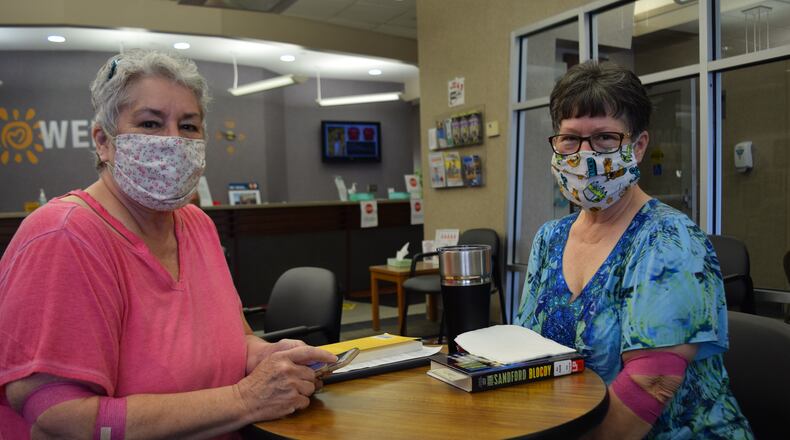The three women are participants in the Dayton COVID-19 Convalescent Plasma Program, which began in April. Dayton-based Community Blood Center collects the antibody-rich plasma from coronavirus survivors, which in turn helps critically ill patients at local hospitals and outside the region.
Rosemary Saunders and Margaret Brown, sisters from the Miami County village of Pleasant Hill, donated blood together after both contracting and recovering from the coronavirus.
Saunders’ son Ed Kauffman died April 3 of the coronavirus in a hospital. Kauffman, 50, had Down syndrome and diabetes, and he loved to bowl, play in the Riverside Bell Choir and serve on the Champaign Residential Services Inc. board, according to a release from the CBC.
Coronavirus: Complete coverage
“I never got to see him,” Saunders said. “The nurses tried to help me talk to him, comfort him, to hear my voice, but that was the most that we could do.”
Saunders had been exposed to the virus and isolated for two weeks after the death of her son. She was tested and, on April 19, learned she was positive.
Brown was working at the SpringMeade Healthcare Center in Tipp City when she began to feel symptoms.
“I had a fever, dizziness, body aches,” she said. “I stayed home and got tested on March 26.”
Brown received her results April 5, two days after her nephew’s death. She was positive, so she isolated herself for the next two weeks.
Brown read about the Convalescent Plasma Program on the CBC website and contacted her sister about participating.
The two drove to Dayton together to donate their plasma because they wanted to do something to help others during this difficult time in their lives.
“We do what we can do to make a good situation out of a bad situation,” Saunders said.
Wanting to make good out of a bad situation as well, Jennifer Meyer of Centerville shared her story while donating plasma.
On March 3, Meyer and three friends traveled to Spain for a three-week vacation.
A few days into the trip, she received news that her 91-year-old mother had fallen and broken her hip. Then the coronavirus spiked in Spain and the U.S. State Department advised people to return to the country or risk being stuck abroad.
Health Care Hero: ‘I was called to do this’
After the announcement, Meyer described the environment there as “crazy” as people packed airports trying to get home. The group of friends spent a night in a hotel near the airport and flew out the next day.
“It was a crazy couple of days,” Meyer said. “The hotel we stayed in, the next day they turned it into a hospital.”
Her struggles did not stop once back home. All four of the travelers had fevers, and Meyer tested positive for COVID-19. This meant she could not see her mother.
“She was without me for two months,” Meyer said. “I couldn’t get in her building, they’re very strict. They let caregivers come in, but you have to have a negative test. It’s horrible. She fell again and is not doing well.”
After two more tests, Meyer tested negative. She was able to see her mother and learned about the CCP program going on in Dayton.
As of June 3 she made her third plasma donation and is on schedule to donate every two weeks.
She gets messages from the CBC about where her donation is going to help someone fighting COVID-19.
“I can’t tell you how much I appreciate getting that,” Meyer said. “It’s very cool. I love doing it and knowing it went to good use.”
Information about the program, eligibility and how to donate can be found on the CBC's website.
About the Author

